Gene and Vicki Barnhart split time between their home and their primary breeding facility near La Center, Washington.
Gene is the trainer with 30 years’ of experience training bird dogs at every level from amateur to professional. “The hard stuff doesn’t work” and “you can’t leave a fingerprint on a dog” are two things we hear Gene say a lot to our clients. Gene guided at Highland Hills Ranch for many years before running a large wingshooting operation at another Oregon ranch.
Vicki is Gene’s wife and is masterful at breeding, whelping, raising and socializing our puppies. Vicki is wonderful at keeping up with our clients over the years and making sure all of her pups are continuing to thrive.
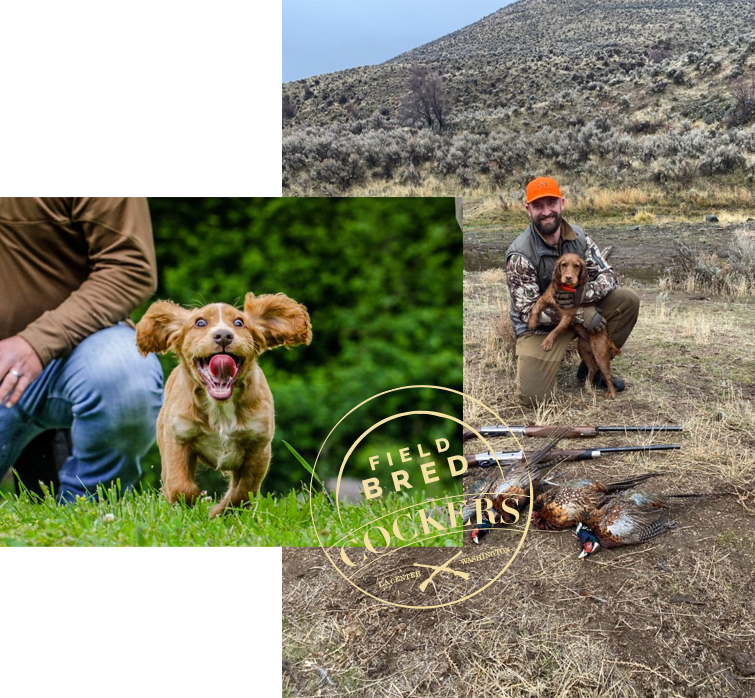
Our facility at Vallivue Sporting Dogs, is designed especially for the dogs. Dogs have private runs with cozy dog house that are secure inside of a large arena, each night they are tucked in a warm crate. These dogs have so much personality they enjoy telling us when its feeding time and defiantly if we are late. The facility is set on a private drive overlooking a grass meadow. There is large grass field and a pond for play time, along with indoor space to play and socialize with one another. The dogs enjoy our training camp and go home with a smile.
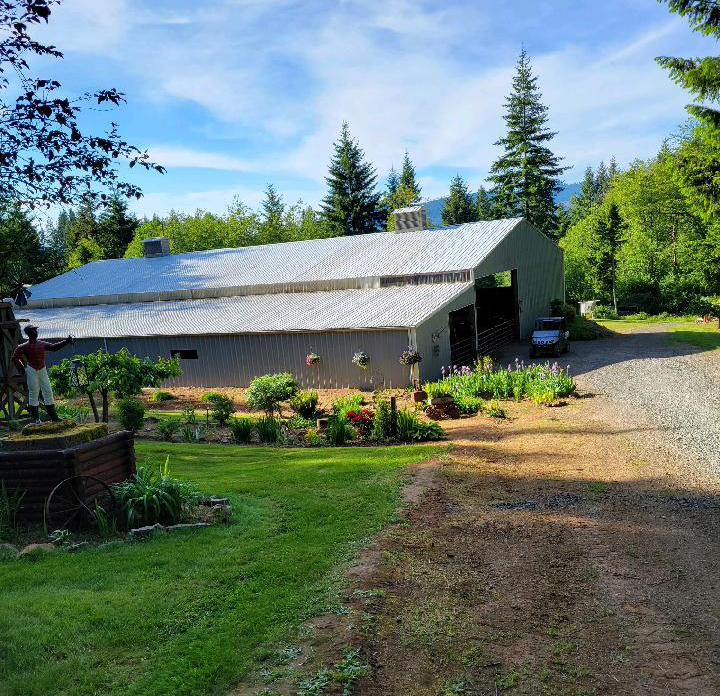
Do I have to be a hunter to get one of your dogs?
No, we have many non-hunting clients that respect and want the strong health and intelligence characteristics of a field bred dog. Typically our non-hunting clients are active and looking for an equally active adventure partner on the trail.
How energetic are your dogs?
Field cockers are filled with happy energy and always ready to go and please. They need normal, regular exercise and are not meant to be inside-only companions We personally use and encourage place training for the home. This teaches your cocker when it’s go-time and when it’s time to hang out.
Do they shed and require grooming?
Yes cockers shed and we recommend grooming. On an anecdotal, non-scientific shedding scale of 1-10 with a poodle being a 1 and a golden retriever being a 10, we would estimate a field cocker to be between 4-5. We have our groomer give the dogs a “field cut” around four times each year to remove feathering behind legs, in between toes, and on undercarriage. This is essential in Oregon for cheatgrass prevention! ShowSheen is great to spray on after bathing or when needing to brush out a cocker after a muddy or thorn-filled day in the field.
How long does it take to get a field cocker from you?
Generally speaking, six to twelve months but this can vary with Mother Nature! Due to high demand and cocker litter sizes being on average four to eight pups all our pups are sold long before they are born. Please fill out the information on our Talk to Us so we can learn about your goals, timing, and get the process started for reserving your future pup, Super Pup, or Home + Hunt Ready field cocker.

What do you recommend for training?
Field cockers are very intelligent which is a great thing if trained well and a liability if not trained. The best investment you can make is putting quality time into training your dog. Many of our clients are successful doing the training themselves while others outsource to a professional trainer. Whichever path you ultimately choose, the importance of the training investment is nonetheless the same. For clients doing training themselves we guide them towards the European spaniel methods and placeboard methods with many examples on YouTube. For those wanting professional training, our internal and Lead Trainer Gene Barnhart is hands down the best there is and is.
What birds are good for hunting with a field cocker?
Upland birds are best suited for field cockers. If they’re in thick, heavy cover that’s even better for a cocker. “Cocker” comes from Woodcock which is an upland bird that lives in heavy cover just to give you an idea. Personally we hunt our cockers on pheasant, quail, chukar and hungarian partridge and grouse. Jump shooting the occasional duck and watching a cocker water retrieve is also fun but not our go-go. We also have great success hunting cockers behind pointing dogs; this requires a cocker to be reliable at remote sit which we teach via placeboards.
What do you feed your cockers?
We feed Purina Pro Plan Sport 30/20 year-round to our dogs including puppies and pregnant females. This food is a 28% protein, 20% fat which is a great balance between performance and maintenance foods. On average our adult cockers eat 1/2 cup in the morning and 3/4 cup in the evening of this specific dog food.
What products do you use and recommend your dog owners have on hand for their dogs?
First is high quality food (see above). Second is a safe place to keep your dog and we recommend Ruff Land Kennels either medium or mid-size crate. Third are placeboards and slip leads from Cato Outdoors for training.
What is the lifespan and how much do they weigh?
Typically 12-14 years and between low-20 pounds to low-30 pounds.30
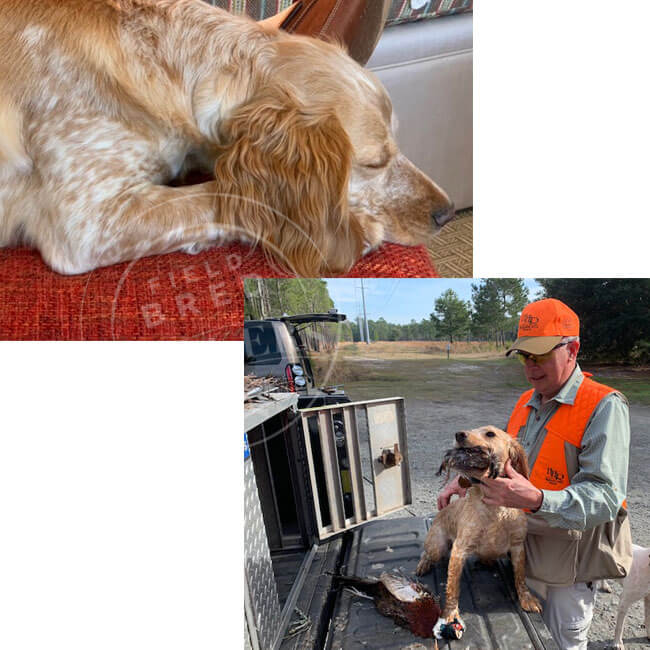
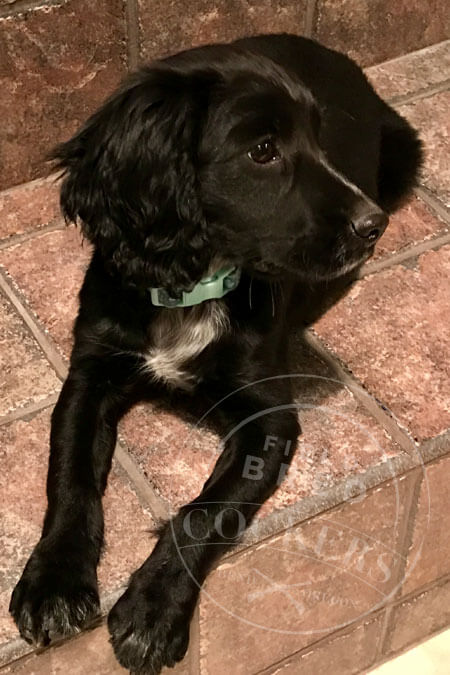
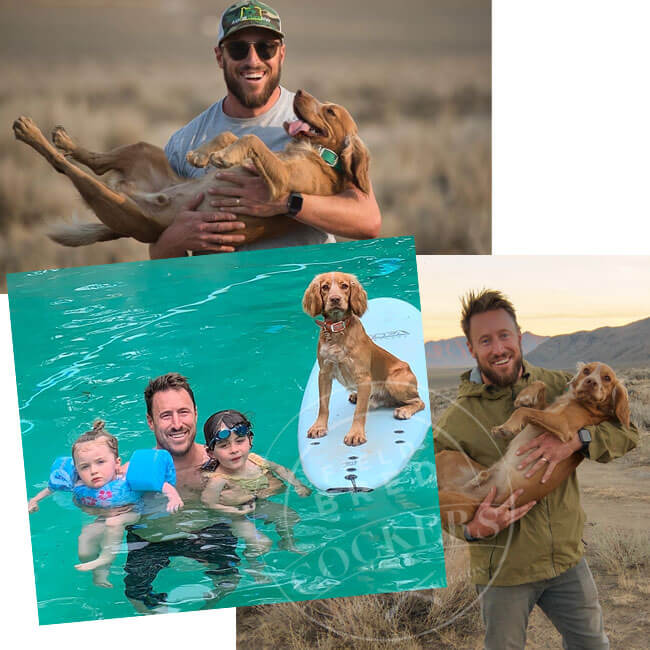
Website Design + Development by Kate Miller Design
Photography by Nikki Trular and Jack Walker